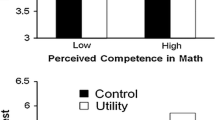Abstract
Private secondary school students differing in achievement motivation took part in a learned helplessness experiment using a triadic design and noncontingent rewards. A clear learned helplessness effect was observed in both high and low achievement motivation groups. The findings confirmed those from an earlier study using younger subjects drawn from a lower socioeconomic background. However, the results of both experiments were quite different from those of another recently reported investigation using university students that found facilitation as well as an interaction between achievement motivation level and treatment (Jardine & Winefield, 1981). It is concluded that the development of learned helplessness probably depends on the kind of environment in which noncontingent outcomes are experienced.
Similar content being viewed by others
References
Buys, N. J., & Winefield, A. H. Learned helplessness in high school students following experience of noncontingent rewards.Journal of Research in Personality 1982,16 118–127.
Cohen, S., Rothbart, M., & Phillips, S. Locus of control and the generality of learned helplessness in humans.Journal of Personality and Social Psychology 1976,34 1049–1056.
Coyne, J. C., Metalsky, G. I., & Lavelle, T. L. Learned helplessness as experimenter-induced failure and its alleviation with attentional redeployment.Journal of Abnormal Psychology 1980,89 350–357.
Eisenberger, R., & Leonard, J. M. Effects of conceptual task difficulty on generalized persistence.American Journal of Psychology 1980,93 285–298.
Jackson, P. W.Life in classrooms. New York: Holt, Rinehart & Winston, 1968.
Jardine, E., & Winefield, A. H. Achievement motivation, psychological reactance, and learned helplessness.Motivation and Emotion 1981,5 99–113.
McReynolds, W. T. Learned helplessness as a schedule-shift effect.Journal of Research in Personality 1980,14 139–157.
Miller, I. W., & Norman, W. H. Learned helplessness in humans: A review and attribution-theory model.Psychological Bulletin 1979,86 93–118.
Rosen, C. E. The impact of an open campus program upon high school students' sense of control over their environment.Psychology in the Schools 1977,14 216–219.
Rosenthal, R.Experimenter effects in behavioral research. New York: Appleton-Century-Crofts, 1966.
Rotter, J. B. Generalized expectancies for internal versus external control of reinforcement.Psychological Monographs, 1966,80(1, Whole No. 609).
Seligman, M. E. P.Helplessness. San Francisco: Freeman, 1975.
Smith, J. M. A quick measure of achievement motivation.British Journal of Social and Clinical Psychology 1973,12 137–143.
Tresselt, M. E., & Mayzner, M. S. Normative solution times for a sample of 134 solution words and 378 associated anagrams.Psychonomic Monograph Supplements 1966,1 293–298.
Winefield, A. H., & Fay, P. M. Effects of an institutional environment on responses to uncontrollable outcomes.Motivation and Emotion 1982,6 103–112.
Winer, B. J.Statistical principles in experimental design. New York: McGraw-Hill, 1971.
Wortman, C. B., & Brehm, J. W. Responses to uncontrollable outcomes: An integration of reactance theory and the learned helplessness model. In L. Berkowitz (Ed.),Advances in Experimental Social Psychology 1975,8 301–316.
Author information
Authors and Affiliations
Additional information
The author acknowledges the assistance of Susan Bankes, who tested the subjects, and thanks the teachers and students of Pembroke College for their help.
Rights and permissions
About this article
Cite this article
Winefield, A.H. Cognitive performance deficits induced by exposure to response-independent positive outcomes. Motiv Emot 7, 145–155 (1983). https://doi.org/10.1007/BF00992898
Issue Date:
DOI: https://doi.org/10.1007/BF00992898




